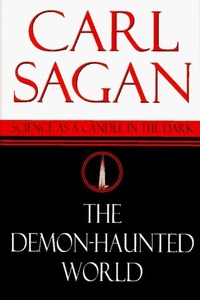Take a photo of a barcode or cover
hopeful
inspiring
reflective
medium-paced
Vital reading about critical thought and its role in shaping society, for better and worse.
informative
inspiring
reflective
slow-paced
challenging
informative
inspiring
reflective
slow-paced
This book is just as relevant NOW as when Sagan published in the 90s. Maybe even more so. Science and democracy go hand in hand.
It is not the Bible, but this book, that every person should read at least once in their lifetime, the earlier, the better.
challenging
hopeful
informative
inspiring
Some essays are definitely better than others, yet for a 20 year old book, a lot of Sagan's concerns are still unfortunately relevant.
Carl Sagan is a genius, he saw the world so clearly and predicted the future so accurately while still maintaining hope and optimism
challenging
informative
reflective
medium-paced
challenging
hopeful
informative
inspiring
medium-paced
challenging
dark
emotional
hopeful
informative
inspiring
mysterious
reflective
tense
medium-paced
I think that Carl Sagan was at the frontline of teaching that science is a virtue, and should be unburdened by governments and religions.
This book exemplifies that and is pretty much the bread and butter of the whole thing. I think that after analyzing and debunking a lot of what the world decides to be skeptical about (UFOS, witches, Religious bigots) can be otherwise used to question everything around us.
I think that Sagan is right that for example when a child asks why the grass is green many of our elders chuck it off as a silly question, perhaps aware that they also don’t know the answer and therefore this inquiry leads to a suppressed view of the world as a whole. This child grows to be the same and never questions anything else in life.
Ultimately it leads to what many people are today. Willful ignorants when it comes to questioning authority (trump).
Overall I think that this book was an intriguing analysis into the future that Carl Sagan envisioned (present day) where many of his predictions and observations are true if not worse than they were when he wrote this book.
One of the examples that shocked me was that of smoking and how (despite my thoughts that less people smoke today than anytime before) like Carl Sagan predicted nearly 10 million people died recently of tobacco related illnesses. A fact that shocked me as I thought that more than any period in our history some people today were not idiotic enough to realize that tobacco still kills…
I think that Sagan can appeal to any reader whether Religious or not and i think it’s necessary for those on both sides to read this. I’ve always been impartial to religion, despising everything having to do with it but earlier discoveries and the affirmations of scientists like Sagan make me realize that there is a way to work together. Where kids in a religious household are taught how the world works instead of simply chucking it off to “gods plan”.
"Every question is a cry to understand the world"
"For me, it is far better to grasp the Universe as it really is than to persist in delusion, however satisfying and reassuring."
"If we resolutely refuse to acknowledge where we are liable to fall into error, then we can confidently expect that error - even serious error, profound mistakes - will be our companion forever. But if we are capable of a little courageous self assessment, whatever rueful reflections they may engender, our chances improve enormously."
This book exemplifies that and is pretty much the bread and butter of the whole thing. I think that after analyzing and debunking a lot of what the world decides to be skeptical about (UFOS, witches, Religious bigots) can be otherwise used to question everything around us.
I think that Sagan is right that for example when a child asks why the grass is green many of our elders chuck it off as a silly question, perhaps aware that they also don’t know the answer and therefore this inquiry leads to a suppressed view of the world as a whole. This child grows to be the same and never questions anything else in life.
Ultimately it leads to what many people are today. Willful ignorants when it comes to questioning authority (trump).
Overall I think that this book was an intriguing analysis into the future that Carl Sagan envisioned (present day) where many of his predictions and observations are true if not worse than they were when he wrote this book.
One of the examples that shocked me was that of smoking and how (despite my thoughts that less people smoke today than anytime before) like Carl Sagan predicted nearly 10 million people died recently of tobacco related illnesses. A fact that shocked me as I thought that more than any period in our history some people today were not idiotic enough to realize that tobacco still kills…
I think that Sagan can appeal to any reader whether Religious or not and i think it’s necessary for those on both sides to read this. I’ve always been impartial to religion, despising everything having to do with it but earlier discoveries and the affirmations of scientists like Sagan make me realize that there is a way to work together. Where kids in a religious household are taught how the world works instead of simply chucking it off to “gods plan”.
"Every question is a cry to understand the world"
"For me, it is far better to grasp the Universe as it really is than to persist in delusion, however satisfying and reassuring."
"If we resolutely refuse to acknowledge where we are liable to fall into error, then we can confidently expect that error - even serious error, profound mistakes - will be our companion forever. But if we are capable of a little courageous self assessment, whatever rueful reflections they may engender, our chances improve enormously."
"I have a foreboding of an America in my children's or grandchildren's time - when the United States is a service and information economy; when nearly all the key manufacturing industries have slipped away to other countries when awesome technological powers are in the hands of a very few, and no one representing the public interest can even grasp the issues; when the people have lost the ability to set their own agendas or knowledgeably question those in authority when, clutching our crystals and nervously consulting our horoscopes, our critical faculties in decline, unable to distinguish between what feels good and what's true, we slide, almost without noticing, back into superstition and darkness."
"Every age has its peculiar folly; some scheme, project, or phantasy into which it plunges, spurred on either by the love of gain, the necessity of excitement, or the mere force of imitation. Failing in these, it has some madness, to which it is goaded by political or religious causes, or both combined."
"Fear of things invisible is the natural seed of that which every one in himself calleth religion."
--Thomas Hobbes, Leviathan (1651)





